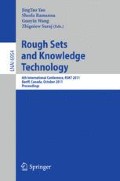Abstract
Rough set theory is a powerful tool for feature selection. To avoid the information loss by discretization in rough sets, fuzzy rough sets are used to deal with the continuous values. However, the cost of computation of the approach is too high to be worked out as the number of selected features increases. In this paper, a new computational method is proposed to approximate the conditional mutual information between the selected features and the decision feature, and thus improve the efficiency and decrease the complexity of the classical fuzzy rough approach based on mutual information. Extensive experiments are conducted on the large-sized coal-fired power units dataset with steady state, and the experimental results confirm the efficiency and effectiveness of the proposed algorithm.
Access this chapter
Tax calculation will be finalised at checkout
Purchases are for personal use only
Preview
Unable to display preview. Download preview PDF.
References
Yu, L., Liu, H.: Feature Selection for High-Dimensional Data: A Fast Correlation-Based Filter Solution. In: Proceedings of the Twentieth International Conference on Machine Learning (ICML-2003), Washington DC (2003)
Jensen, R., Shen, Q.: New Approaches to Fuzzy-Rough Feature Selection. IEEE Transactions on Fuzzy Systems 17(4), 824–838 (2009)
Hu, Q.H., Xie, Z.X., Yu, D.R.: Hybrid Attribute Reduction Based on A Novel Fuzzy-rough Model and Information Granulation. Pattern Recognition 40, 3509–3521 (2007)
Jensen, R., Shen, Q.: Computational Intelligence and Feature Selection: Rough and Fuzzy Approaches. Wiley-IEEE Press (2008)
Pawlak, Z.: Rough Sets: Theoretical Aspects of Reasoning About Data. Kluwer, Norwell (1991)
Xu, F.F., Miao, D.Q., Wei, L.: Fuzzy-rough Attribute Reduction via Mutual Information with An Application to Cancer Classification. Computer and Mathematics with Applications 57, 1010–1017 (2009)
Peng, H., Long, F., Ding, C.: Feature Selection Based on Mutual Information: Criteria of Max-Dependency, Max-Relevance, and Min-Redundancy. IEEE Transactions on Pattern Analysis and Machine Intelligence 27(8), 1226–1238 (2005)
Maji, P., Paul, S.: Rough Set Based Maximum Relevance-Maximum Significance Criterion and Gene Selection from Microarray Data. Int. J. Approx. Reason. (2010) (in press)
Author information
Authors and Affiliations
Editor information
Editors and Affiliations
Rights and permissions
Copyright information
© 2011 Springer-Verlag Berlin Heidelberg
About this paper
Cite this paper
Xu, F., Pan, W., Wei, L., Du, H. (2011). An Efficient Fuzzy Rough Approach for Feature Selection. In: Yao, J., Ramanna, S., Wang, G., Suraj, Z. (eds) Rough Sets and Knowledge Technology. RSKT 2011. Lecture Notes in Computer Science(), vol 6954. Springer, Berlin, Heidelberg. https://doi.org/10.1007/978-3-642-24425-4_15
Download citation
DOI: https://doi.org/10.1007/978-3-642-24425-4_15
Publisher Name: Springer, Berlin, Heidelberg
Print ISBN: 978-3-642-24424-7
Online ISBN: 978-3-642-24425-4
eBook Packages: Computer ScienceComputer Science (R0)

